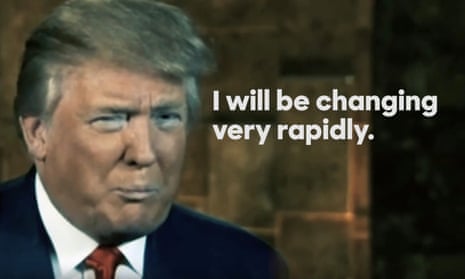Hillary Clinton unveiled a major new attempt to use Donald Trump’s words against him at the weekend, as both she and rival Bernie Sanders adjusted course near the end of the race for the Democratic presidential nomination.
While Clinton turned toward an anticipated general election showdown with Trump, Sanders invited Democrats to take a broader view of his role in the race than just as a contender, telling CNN he was out to “revitalize American democracy”.
“We have got to involve people. And it’s not easy, because so many people have given up on the political process, including a whole lot of low-income people,” he said. “Our job is to bring people into the political process.”
Sanders vowed to fight on through the last voting in June and predicted a payoff for Democrats in November.
“What is good for America, what is good for the Democratic party, is to see a whole lot of people debating the real issues impacting our country,” said the Vermont senator. “That’s how you have a large voter turnout. And when you have a large voter turnout, Democrats and progressives win, and Republicans will lose.”
He made clear that his aspirations extended beyond the primary race, telling CBS: “We can change the dynamics of American politics, so it is not just big money interests who help elect candidates.”
Citing his striking support from young people, the senator claimed a much larger mantle than simply Democratic nominee. “We are the future of the Democratic party,” he said.
But as Sanders described tilting the general election battlefield, Clinton was already fighting there.
A video released by her campaign late Saturday rounded up some of the most controversial things Trump has said in the 10 months he has been running for president, beginning with his characterization of Mexicans as rapists and ending with his boast that he could “stand in the middle of 5th Avenue and shoot somebody” and not lose any votes.
“Donald Trump wants you to forget everything he’s said,” the video warns. “Don’t.”
Clinton was more succinct in a Saturday tweet: “Does Trump think he can fool us into forgetting his hateful rhetoric? Sad!”
A top Trump surrogate, Paul Manafort, told Republican officials last week that Trump was about to transfigure his persona and that “the part he’s been playing is evolving”. Manafort said Sunday that the remark, made in a closed-door session but recorded by the Associated Press, had been misconstrued and that he meant to reassure the party that Trump could adjust to “the context” of either a campaign rally or a policy speech.
Trump has long anticipated a general election showdown with Clinton, predicting at a rally in Pennsylvania last week: “We’re going to beat her so badly.” Sanders showed signs on Sunday of accepting that version of a general election contest, too, though he repeated: “I think we do have a path to victory.
“I think we have come a very, very long way in the last year, and we’re going to fight for every last vote until the California and the DC primary,” he said.
The Democratic senator’s description of his quest to drive turnout was a more inflected response to the question of his future plans than one he gave a month ago, when he bluntly dismissed the suggestion that he withdraw from the race as “absurd”.
Sanders has come under increasing pressure to announce an exit strategy, with David Plouffe, a former senior adviser to Barack Obama and a Clinton supporter, tweeting last week that it was “fraud” for the Vermont senator to continue to raise money and say he has a path to nomination.
Sanders would need to capture 59% of the remaining pledged delegates to win a majority, according to an NBC News analysis, after capturing an average of 45% so far. Two network polls released Sunday showed Clinton with a double-digit lead in Pennsylvania, which votes Tuesday.
In the discussion of Sanders’ future, Clinton herself has gone as far as to brandish the significant example of her own withdrawal from the 2008 presidential nominating competition. “People remember that President Obama and I ran a really tough race for the entire primary season, and he ended up with more delegates,” she told an interviewer Thursday.
She did not quibble with a subtle hint: “And I withdrew, I endorsed him and then I got to work.”

Comments (…)
Sign in or create your Guardian account to join the discussion